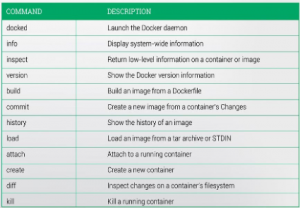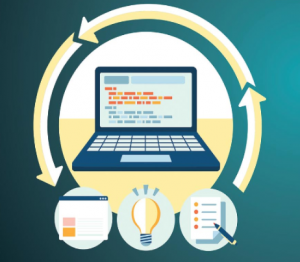What are some of commonly used Docker command?
Below are some commonly used Docker commands:

The cp command can be used to copy files. One specific file can be copied like:
docker cp foo.txt mycontainer:/foo.txt
docker cp mycontainer:/foo.txt foo.txt
Multiple files contained by the folder src can be copied into the target folder using:
docker cp src/. mycontainer:/target
docker cp mycontainer:/src/. target
In order to copy a file from a container to the host, you can use the command
docker cp

Every application will have their own dependencies, which include both software and hardware resources. Docker containers bring plentiful of unknown tags compared to the existing technologies in use. Docker is an open platform for developers, it’s mechanism helps in isolating the dependencies per each application by packing them into containers. Containers are scalable and secure to use and deploy as compared to other previous approaches.
Virtual machines are used broadly in cloud computing. Isolation and resource control have continually been achieved through the use of virtual machines. Virtual machine loads a full OS with its own memory management and enables the applications to be more organized and secure while ensuring their high availability.
So let’s dive deep in and know the major differences between Docker and VMs and know how they might be useful to your resources. So let’s dive deep in and know the major differences between Docker and VMs and also how they might be useful to your resources.
HOW IS DOCKER DIFFERENT FROM VMS?
Virtual machines contain a full OS with its own memory management installed with-in the associated overhead of virtual device drivers. In a virtual machine, valuable resources are duplicated for the guest OS and hypervisor, which makes it possible to run in many instances of one or more operating systems in parallel on a single machine. Every guest OS runs as an individual entity from the host system.
On the other hand, Docker containers are executed with the Docker engine rather than the hypervisor. Containers are smaller than Virtual Machines and enable faster startup with better performance, less isolation, and greater rapport is possible because of sharing the host’s kernel.
THE DIFFERENCES BETWEEN DOCKER AND VIRTUAL MACHINE
When it comes to the comparison, Docker Containers have much more potential than Virtual Machines. It is noticeable that Docker Containers are able to share a single kernel and shares the application libraries. Containers present in a lower system overhead than Virtual Machines and the performance of the application inside a container is generally same or better when compared to the same application running on a Virtual Machine.
There is one major key point where Docker Containers are frail than Virtual Machines, and that is “Isolation”. Intel’s VT-d and VT-x technologies have provided Virtual Machines with ring-1 hardware isolation of which, it takes full advantage. It helps the Virtual Machines from breaking down and in interfering with each other but Docker Containers do not have any hardware isolation.
Compared to virtual machines, containers can be bit faster as-long-as the user is willing to stick to a single platform to provide the shared operating system. A virtual machine takes more time to create and launch whereas a container can be created and launched within few seconds. Applications contained in containers offers versatile performance when compared to running the applications within a virtual machine.
VMS AND CONTAINERS, WHEN COMBINED, ARE BETTER TOGETHER
Sometimes one can use a hybrid approach which makes use of both VM and Docker. There are also workloads which are well suited for physical hardware. If both are placed in a hybrid approach, it might lead to a better and well-organized scenario.
Below are a few of them, which explains how they work together as a Hybrid:
THE VERDICT
Using Docker or any other container solution in combination with a virtual machine is an option. By combining the two different technologies one can get the benefits of both technologies: The security of the virtual machine with the execution speed of containers.
Knowing the capabilities of the tools in the toolbox is the most important thing. There are a number of different things to keep in mind when doing that. However, in the case of containers Vs virtual machines, there is no one particular reason to choose just one. It can be a perfect world and you can choose both.
Rocket tries to build things differently from Docker in several aspects:
Composition: Tools for downloading, installing, and running containers should be independent and composable.
Security: Isolation should be pluggable, with image auditing and application identity.
Image distribution: Image discovery should be federated and distributed, with pluggable alternative protocols such as BitTorrent or easier private distribution without a registry.
Open: The format and runtime should be well-specified and developed by a community, allowing independent implementations of tools to be consistent.
Docker is a basic tool that you should start incorporating into your daily development and ops practices.
Docker is a basic tool that you should start incorporating into your daily development and ops practices.
* Use Docker when you want to distribute/collaborate on your app’s operating system with a team
* Use Docker whenever your app needs to go through multiple phases of development (dev/test/qa/prod, try Drone or Shippable, both do Docker CI/CD)
Use Docker with your Chef Cookbooks and Puppet Manifests (remember, Docker doesn’t do configuration management)
Docker Lifecycle:
docker create creates a container but does not start it.
docker rename allows the container to be renamed.
docker run creates and starts a container in one operation.
docker rm deletes a container.
docker update updates a container’s resource limits.